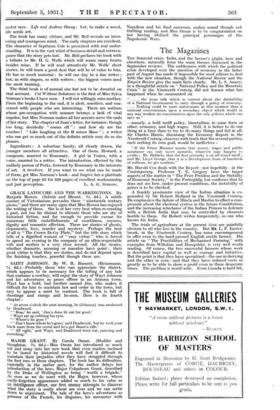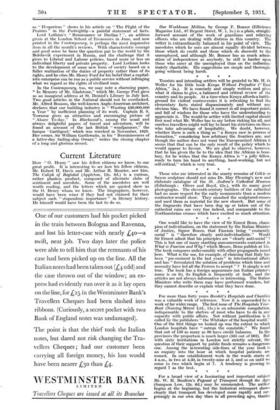The Magazines
THE financial crisis, India, and the farmer's plight, here and elsewhere, naturally form the main themes discussed in the September reviews. The suddenness with which the political crisis developed over the question of economy in the latter part of August has made it impossible for most editors to deal with the new situation, though the National Review and the Empire Review give the main facts clearly. Mr. L. S. Amery, in a thoughtful article on " National Policy and the Monetary Crisis " in the Nineteenth Century, did not foresee what has happened when he commented on " . . . the loose talk which is current about the desirability of a National Government to carry through a policy of economy. . . . Nothing could be more unfortunate at this moment than a national concentration upon a secondary object which would in any way weaken its concentration upon the only policies which can save us " —namely, a bold tariff policy, bimetallism in some form or other, economy, and high wages. Still, it is better to do one thing at a time than to try to do many things and fail in all. Sir Charles Harris, discussing the Economy Report in the Nineteenth Century, observes with truth that the several parties, each seeking its own goal, would be ineffective : " If the Prime Minister insists that money, wages and public assistance can only move upwards, whatever may happen to F rofits ; Mr. Baldwin, that the first necessity is an all-round tariff ; and Mr. Lloyd George, that it is a Development Loan of hundreds of millions, we get nowhere."
Mr. Harold Cox deals with the Report—not hopefully—in the Contemporary. Professor T. E. Gregory faces the larger aspects of the matter in " The Price Problem and the Stability of Economic Society," in the Fortnightly, but confesses that he does not see how, under present conditions, the instability of prices is to be checked.
A frankly pessimistic view of the Indian situation is ex- pounded by Sir Robert Holland in the Nineteenth Century. He emphasizes the failure of Hindu and Muslim to effect a com- promise about the electoral system in the future Constitution, and the increasing reluctance of the Indian Princes to federate with a British India that may be controlled by elements hostile to them. Sir Robert writes temperately, as one who knows his India.
The trials of agriculture at the present time are painfully obvious to all who live in the country But Mr. L. F. Easter- brook, in the Nineteenth Century, has some encouragement to offer even to the hard-pressed English arable farmer. His article on " The Possibilities of Mechanised Farming," with examples from Wiltshire and Hampshire, is very well worth reading. Of course, the two successful farmers whose work is described have capital as well as courage and initiative. But the point is that they have specialized—the one in dairying and the other in corn—and that they have reduced costs so greatly as to be able to show a profit even in these desperate times. The problem is world-wide. Even Canada is hard hit, as " Hespericus " shows in his article on " The Plight of the Prairies " in the Fortnightly—a painful statement of facts.
Lord Lothian's " Renaissance or Decline ? ", an address given at the London School of Economics in June, and now printed in the Contemporary, is perhaps the most impressive item in all the month's reviews. With characteristic courage and good sense he faces the question put to the world by the Bolshevik experiment in Russia, and the challenge that it gives to Liberal and Labour policies, based more or less on individual liberty and private property. Lord Lothian looks to the development of some new form of society based on a fuller realization of the duties of property rather than of its rights, and he cites Mr. Henry Ford for his belief that a capital- istic enterprise can be run as a public service without infringing what we regard as the rights of civilized man.
In the Contemporary, too, we may note a charming paper, " In Memory of Mr. Gladstone," which Mr. George Peel gave as an inaugural address at St. Deiniol's Library in July last. Two good articles in the National should not be overlooked. Mr. Alfred Bossom, the well-known Anglo-American architect, declares that our building industry is " Wasting £30,000,000 a Year " by inefficient planning of its work. Captain B. S. Townroe gives an attractive and encouraging picture of " Alsace To-day." In Blackwood's, among the usual and always delightful papers of travel and adventure, will be found an account of the last British " windjammer," the barque Garthpool,' which was wrecked in November, 1929. Her owner, Sir William Garthwaite, in his " Reminiscences of a latter-day Sailing-ship Owner," writes the closing chapter of a long and glorious record.































 Previous page
Previous page